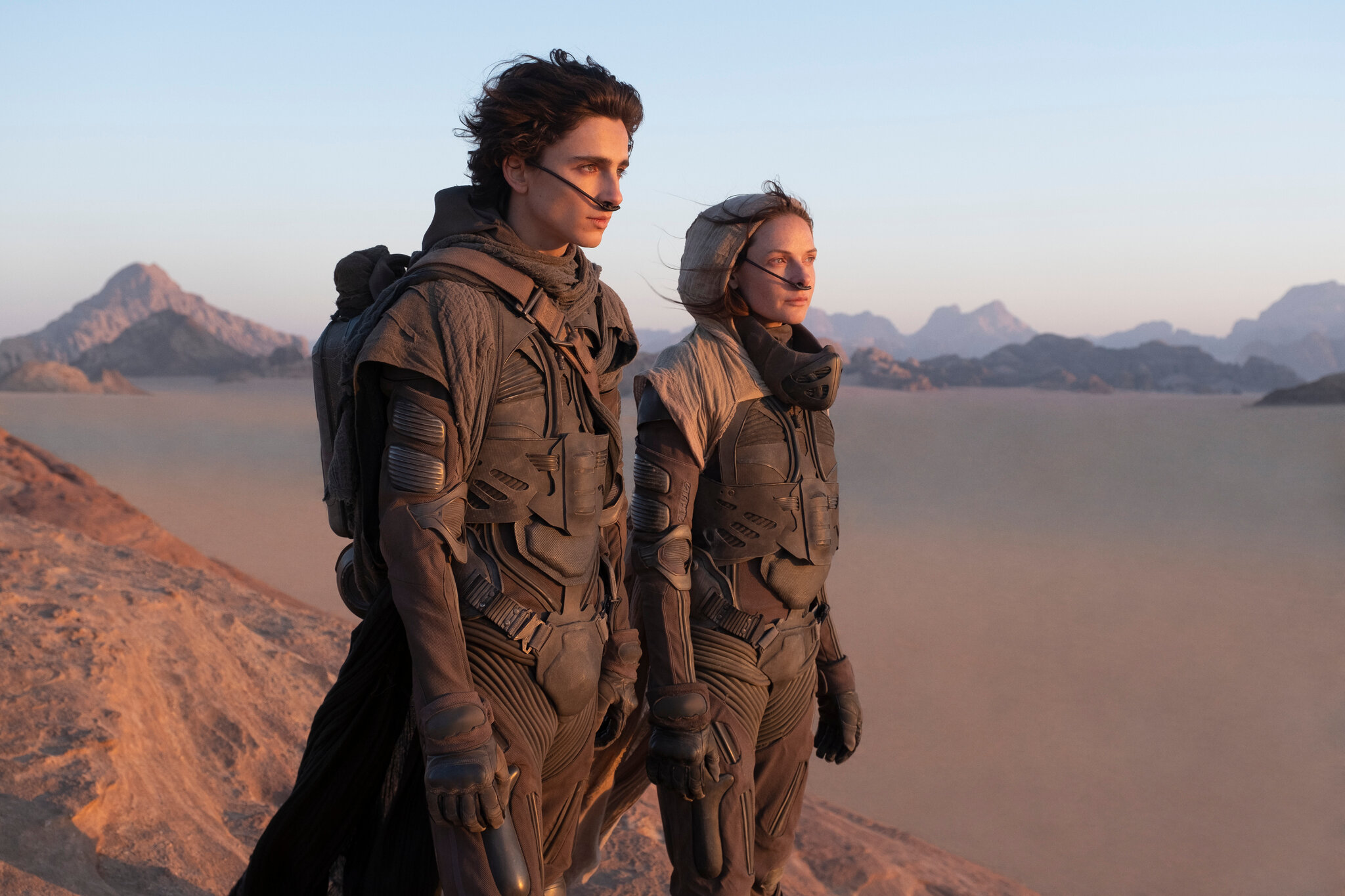🎬 Dune (2021)

Dune (2021) Review
Directed by Denis Villeneuve, Dune (2021) is an ambitious adaptation of Frank Herbert’s seminal sci-fi novel, delivering a visually stunning and deeply immersive cinematic experience. The film, subtitled Part One, tackles the first half of Herbert’s intricate narrative, blending political intrigue, environmentalism, and epic storytelling to lay the groundwork for a sprawling saga.
Plot Overview
Set in a distant future, Dune follows Paul Atreides (Timothée Chalamet), the heir to House Atreides, as his family is tasked with overseeing the desert planet of Arrakis. Known as the source of “spice,” a substance critical for space travel and commerce, Arrakis is both a boon and a trap. House Atreides’ stewardship places them in the crosshairs of political enemies, particularly the brutal House Harkonnen, led by the grotesque Baron Vladimir Harkonnen (Stellan Skarsgård).
As betrayal and war erupt on Arrakis, Paul must confront his burgeoning powers and a destiny intertwined with the planet’s native Fremen people, led by the enigmatic Stilgar (Javier Bardem) and the mysterious Chani (Zendaya). The film explores themes of power, destiny, and the symbiotic relationship between humanity and the environment.
Performances
Timothée Chalamet anchors the film with a nuanced portrayal of Paul, capturing the character’s transformation from a sheltered noble to a figure of great potential and peril. Chalamet’s performance conveys Paul’s internal struggle, balancing vulnerability and quiet intensity.
Rebecca Ferguson delivers a standout performance as Lady Jessica, Paul’s mother and a member of the Bene Gesserit sisterhood. Her portrayal brings depth to a character torn between her loyalty to her family and her secretive, mystical order. Oscar Isaac’s Duke Leto exudes gravitas and compassion, while Stellan Skarsgård’s Baron Harkonnen is a chilling embodiment of corruption and menace.
The supporting cast, including Jason Momoa as the charismatic Duncan Idaho and Josh Brolin as the stoic Gurney Halleck, adds layers of personality to the narrative. Zendaya’s Chani, though limited in screen time, leaves a lasting impression, setting the stage for a more prominent role in the sequel.
Visuals and Cinematography
The visual design of Dune is nothing short of breathtaking. Cinematographer Greig Fraser captures the stark beauty of Arrakis’ desert landscapes, juxtaposing its vast emptiness with the intricate designs of its machinery and architecture. The film’s use of scale, from the colossal sandworms to the imposing starships, emphasizes the grandeur of Herbert’s world.
Villeneuve’s direction immerses viewers in the story’s atmosphere, with meticulous attention to detail in costume design, set construction, and visual effects. The film’s aesthetic, blending futuristic technology with ancient motifs, creates a timeless and otherworldly feel.
Themes and Writing
At its core, Dune is a story about the intersection of politics, religion, and ecology. The screenplay, co-written by Villeneuve, Jon Spaihts, and Eric Roth, effectively distills Herbert’s dense prose into a coherent and engaging narrative. Themes of colonialism, exploitation, and the dangers of hero worship resonate throughout the film, adding depth to its epic scope.
While the film’s deliberate pacing allows for a thorough exploration of its world, it may feel slow to some viewers. The emphasis on world-building occasionally comes at the expense of character development, particularly for secondary figures.
Soundtrack and Sound Design
Hans Zimmer’s score is a masterpiece in itself, blending haunting choral arrangements and experimental instrumentation to create an auditory experience that enhances the film’s epic tone. The sound design, from the rumbling of sandworms to the eerie voice of the Bene Gesserit’s “Voice” command, immerses viewers in the sensory world of Dune.
Strengths and Weaknesses
The film’s greatest strength lies in its ability to bring Herbert’s complex world to life through stunning visuals, immersive sound, and strong performances. Villeneuve’s direction ensures that the narrative’s sprawling elements remain accessible, balancing grandeur with intimacy.
However, the decision to split the story into two parts leaves the film feeling incomplete, with its climax serving more as a prelude to what’s to come. Some viewers may find the pacing and exposition-heavy dialogue challenging, particularly if they are unfamiliar with the source material.
Conclusion
Dune (2021) is a visually spectacular and thematically rich adaptation that sets a high standard for modern sci-fi cinema. While its deliberate pacing and narrative structure may not appeal to everyone, the film’s ambition and artistry make it a must-watch for fans of epic storytelling and thought-provoking cinema.
As a setup for the second installment, Dune succeeds in laying a strong foundation, leaving audiences eager to see the continuation of Paul’s journey. For both longtime fans of Herbert’s novel and newcomers to the franchise, Dune offers an unforgettable cinematic experience that pushes the boundaries of the genre.